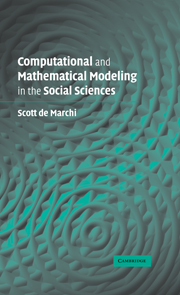Book contents
- Frontmatter
- Contents
- Acknowledgments
- Prelude
- 1 Not All Fun and Games: Challenges in Mathematical Modeling
- 2 Looking for Car Keys Without Any Street Lights
- 3 From Curses to Complexity: The Justification for Computational Modeling
- 4 Why Everything Should Look Like a Nail: Deriving Parsimonious Encodings for Complex Games
- 5 KKV Redux: Deriving and Testing Logical Implications
- 6 A Short Conclusion
- References
- Index
1 - Not All Fun and Games: Challenges in Mathematical Modeling
Published online by Cambridge University Press: 23 July 2009
- Frontmatter
- Contents
- Acknowledgments
- Prelude
- 1 Not All Fun and Games: Challenges in Mathematical Modeling
- 2 Looking for Car Keys Without Any Street Lights
- 3 From Curses to Complexity: The Justification for Computational Modeling
- 4 Why Everything Should Look Like a Nail: Deriving Parsimonious Encodings for Complex Games
- 5 KKV Redux: Deriving and Testing Logical Implications
- 6 A Short Conclusion
- References
- Index
Summary
INTRODUCTION
In large part, the inspiration for this book came from three sources, which can be categorized neatly as a failure, a challenge, and an ideal. First, the failure. When I began teaching in the profession, I was immediately assigned to graduate methods coursework. This is the experience of many professors trained in the last decade with a mathematical bent, and I was lucky enough to teach at an institution with an excellent culture. Unlike many other political science departments that exist in a state in which “there is war of every one against every one,” Duke's political science department is almost entirely free of disputes about the value of mathematical modeling in the social sciences. Divisions of opinion certainly exist but, more or less, everyone in the department recognizes the virtue of mathematical methods for at least some problems.
Better still, even those who do not practice mathematical modeling believe in good research design. As many prospective faculty members discover during their job talks, “methods questions” and questions about research design are just as likely to come from the theorists of the department as anyone else (though couched in different terminology). Between job talks, faculty brown bags, and informal interactions graduate students have with faculty, it would be hard to finish a Ph.D. at Duke and not try your hand at mathematical modeling.
Despite this positive culture, teaching graduate methods coursework has not been easy.
- Type
- Chapter
- Information
- Publisher: Cambridge University PressPrint publication year: 2005



